- Home
- A-Z Publications
- United Nations Office of Disarmament Affairs (UNODA) Occasional Papers
United Nations Office of Disarmament Affairs (UNODA) Occasional Papers
The United Nations Office for Disarmament Affairs (UNODA) publishes the UNODA Occasional Papers series to feature, in edited form, papers that deal with topical issues in the field of arms limitation, disarmament and international security, including statements made at meetings, symposiums, seminars, workshops or lectures.
ISSN (online):
24121258
Language:
English

UNODA Occasional Papers No. 43
Youth and Peace in the Age of AI: Stories by the Sci-fAI Futures Youth Challenge Winners
Feb 2025
Book
This publication contains the winning stories of the Republic of Korea-United Nations Sci-fAI Futures Youth Challenge. The challenge is a creative and thought-provoking initiative designed to engage young minds in imagining the future role of artificial intelligence (AI) in international peace and security. Young people from 13 to 29 submitted written or webtoon stories envisioning a fictional world in the year 2145 where AI would have been taken onboard by milit Read More

UNODA Occasional Papers No. 42
Governance of Artificial Intelligence in the Military Domain
Jun 2024
Book
The integration of artificial intelligence (AI) into military applications such as weapon systems decision-support tools and various other tasks poses opportunities and challenges to international peace and security. Military applications of AI can exacerbate and amplify existing risks and could also lead to new unintended consequences. Rapid developments in this technological domain have outpaced the development of guardrails to mitigate such ri Read More

UNODA Occasional Papers No. 41
Celebrating 45 Years of the Secretary-General’s Advisory Board on Disarmament Matters - Creative, Inclusive and Cooperative Diplomacy at Work
Mar 2024
Book
This Occasional Paper commemorates the forty-fifth anniversary of the Advisory Board on Disarmament Matters (ABDM) a unique body that provides expert advice to the United Nations Secretary-General on issues related to disarmament and international security. Drawing on the insights and experiences of current and former members the publication highlights the Board’s contributions to advancing multilateral disarmament its distinctive features an Read More
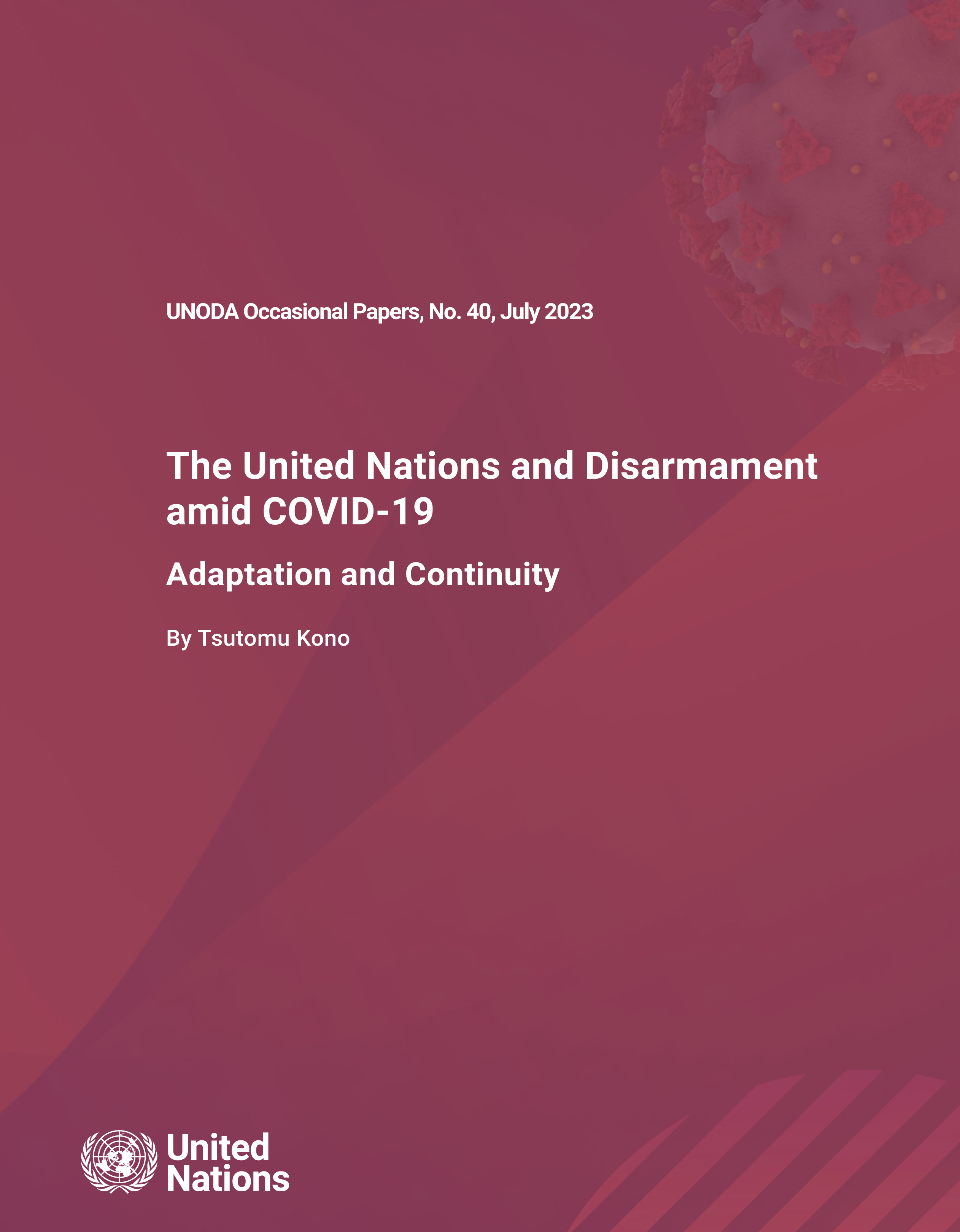
UNODA Occasional Papers No. 40
The United Nations and Disarmament amid COVID-19: Adaptation and Continuity
Sep 2023
Book
The COVID-19 outbreak posed an unprecedented challenge to intergovernmental disarmament institutions and processes. This publication offers an extensive review of relevant developments at the United Nations particularly in the General Assembly and the Security Council as well as in the disarmament machinery and other disarmament bodies and processes. After comparing the varying responses to the pandemic the author considers whether t Read More
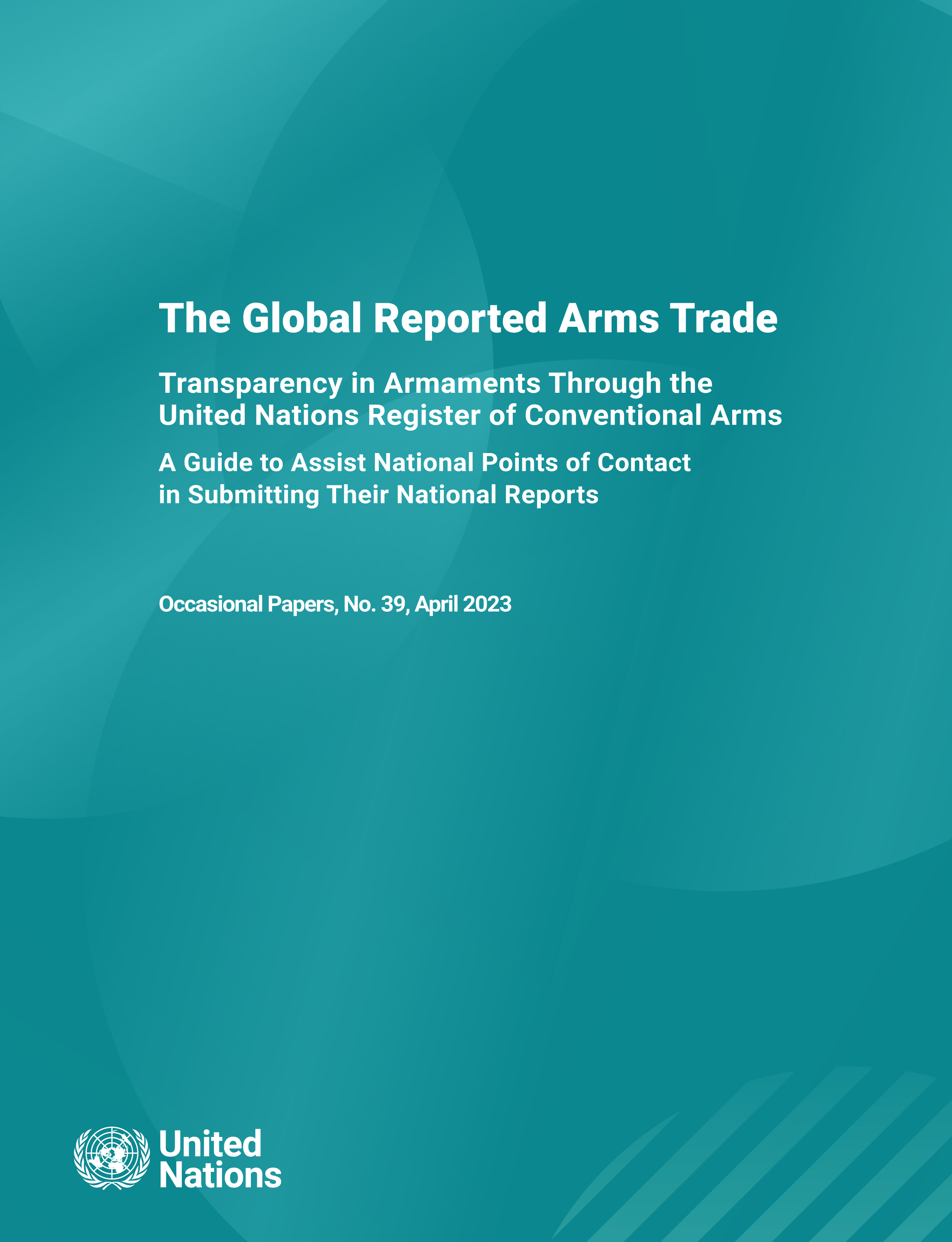
UNODA Occasional Papers No. 39
The Global Reported Arms Trade: Transparency in Armaments Through the United Nations Register of Conventional Arms - A Guide to Assist National Points of Contract in Submitting Their National Reports
May 2023
Book
The United Nations Office for Disarmament Affairs is publishing this paper on the occasion of the thirtieth anniversary of the United Nations Register of Conventional Arms. It aims to provide guidance in support of Member State participation in the Register. The text includes an overview of the Register for reference by Governments and the interested public as well as original material to guide national points of contact in preparing and submitting re Read More
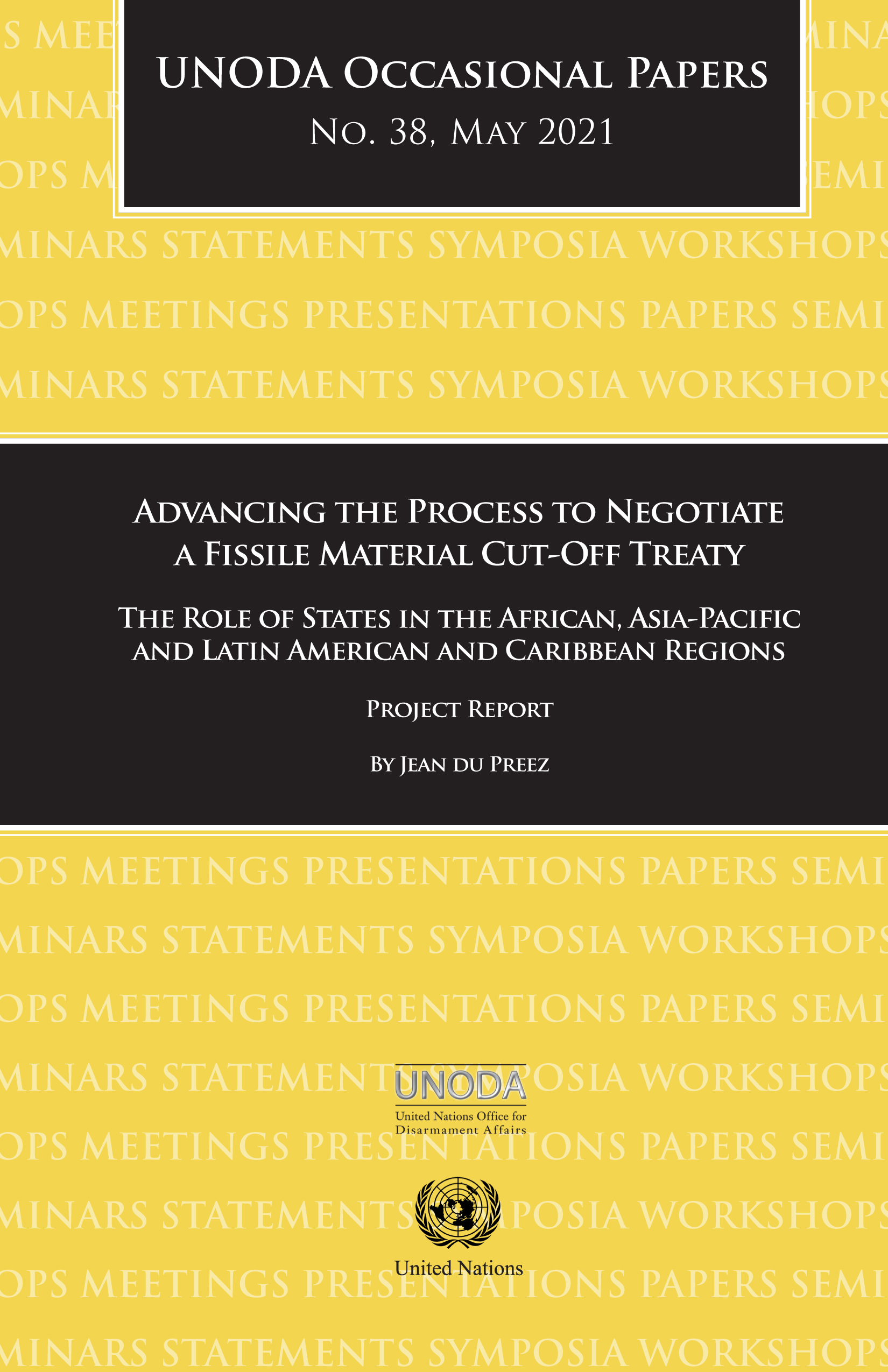
UNODA Occasional Papers No. 38
Advancing the Process to Negotiate a Fissile Material Cut-off Treaty – The Role of States in the African, Asia-Pacific and Latin American and Caribbean Regions
Jun 2021
Book
From June 2018 to December 2019 the European Union and the United Nations Office for Disarmament Affairs held a series of regional workshops and expert meetings to promote participation in the high-level fissile material cut off treaty (FMCT) expert preparatory group consultative process by States in Africa in Asia and the Pacific and in Latin America and the Caribbean. This Occasional Paper offers a review of the project’s outcome as well as perspective Read More
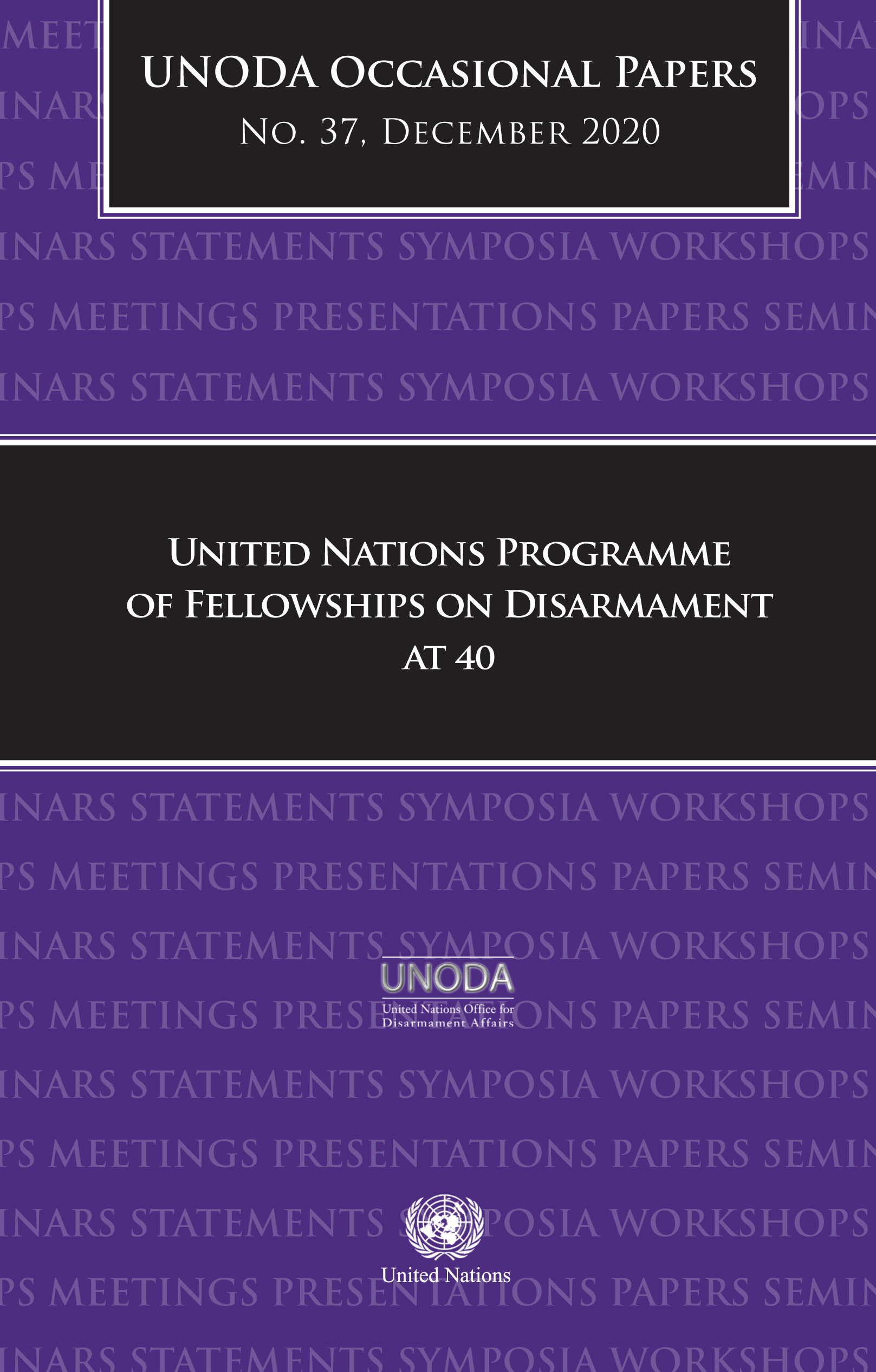
UNODA Occasional Papers No. 37
United Nations Programme of Fellowships on Disarmament at 40
Jan 2021
Book
Over 40 years the Fellowship Programme has successfully trained over 1000 Disarmament Fellows from 170 States many of whom now hold national or international positions of responsibility in the field of disarmament. In this publication Disarmament Fellows representing several generations share their thoughts and feelings about how this programme shaped their professional development as well as insights on how the disarmament field has cha Read More
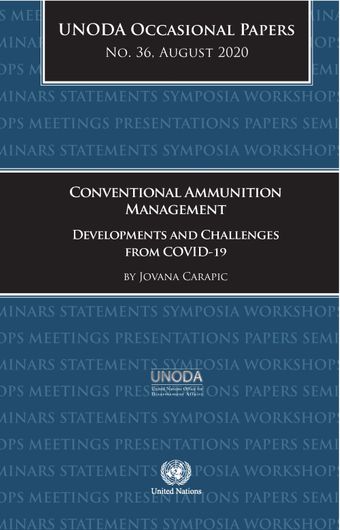
UNODA Occasional Papers No. 36
Conventional Ammunition Management - Developments and Challenges from COVID-19
Sep 2020
Book
This paper offers a preliminary analysis of the effects of COVID-19 (coronavirus) on the ammunition management sector in the spring of 2020. It raises key issues related to the risks associated with conventional ammunition through the implementation of relevant control and management measures. It argues that shifts in national priorities and reduced resources may affect overall international disarmament efforts by undermining the management of c Read More
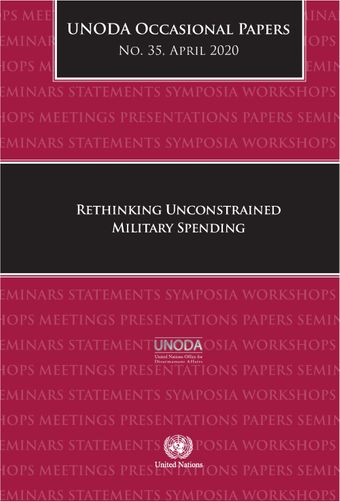
UNODA Occasional Papers No. 35
Rethinking Unconstrained Military Spending
Jun 2020
Book
This publication addresses the issue of military spending from various angles by examining the impact of military expenditures on security; the relationship between military spending and the achievement of the 2030 Agenda for Sustainable Development; the importance of gender perspectives in rethinking unconstrained military spending; and lessons learned from economic conversion movements. It has been published in support of the Sustainable Read More
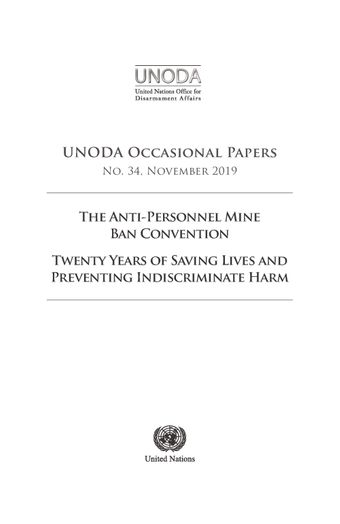
UNODA Occasional Papers No. 34
The Anti-Personnel Mine Ban Convention - Twenty Years of Saving Lives and Preventing Indiscriminate Harm
Dec 2019
Book
This publication describes the achievements and shortfalls of the first twenty years of the Convention on the Prohibition of the Use Stockpiling Production and Transfer of Anti-Personnel Mines and on Their Destruction which entered into force on 1 March 1999. Published with the aim of bringing together diverse perspectives on this key instrument of humanitarian disarmament the paper was written by pioneers and luminaries of the movement that helped Read More
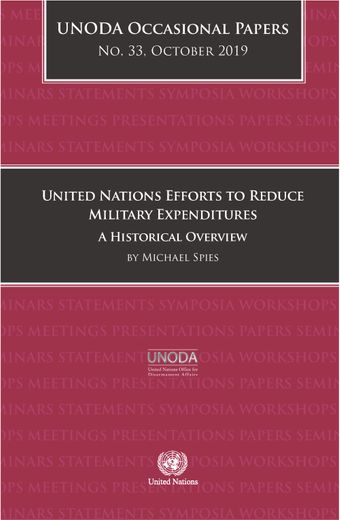
UNODA Occasional Papers No. 33
United Nations Efforts to Reduce Military Expenditures - A Historical Overview
Aug 2019
Book
This publication provides a historic overview of the efforts within the United Nations to reduce military spending. It examines how the discussions on reducing military budgets have evolved in disarmament forums over the last decades. This includes early efforts to pursue the reduction of military spending throughout the Cold War period as a distinct objective of general and complete disarmament the emergence of efforts related to promoting trans Read More
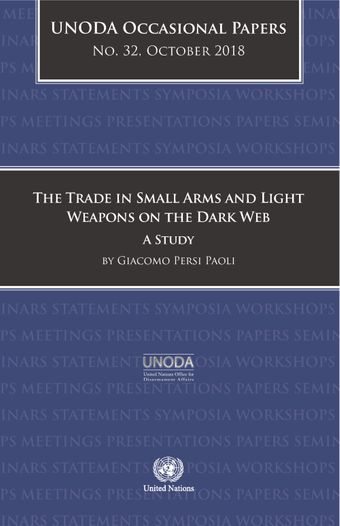
UNODA Occasional Papers No. 32, October 2018
The Trade in Small Arms and Light Weapons on the Dark Web
Nov 2018
Book
This document summarizes the main findings and implications of the first empirical study investigating the scale and scope of arms trafficking on the dark web which was conducted by RAND Europe and the University of Manchester from September 2016 to July 2017. There is an ongoing debate over the extent to which online black markets on the so-called “dark web” the part of the Internet not searchable by traditional search engines and hidden behind Read More
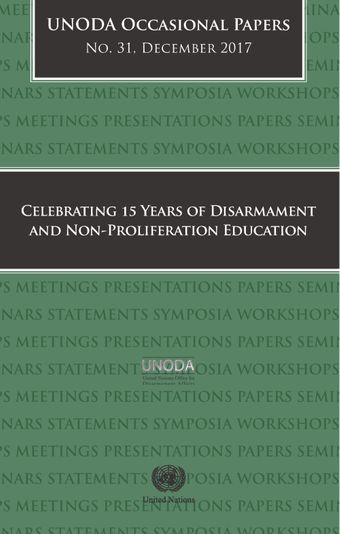
UNODA Occasional Papers No. 31, December 2017
Celebrating 15 Years of Disarmament and Non-Proliferation Education
Apr 2018
Book
This edition of the Occasional Paper published by the United Nations Office for Disarmament Affairs celebrates the fifteenth anniversary of the United Nations Study on Disarmament and Non-Proliferation Education which was presented to the United Nations General Assembly in 2002 (A/57/124). It contains contributions from experts from around the world which showcase fresh perspectives new ideas and innovations in disarmament and non-prolifer Read More
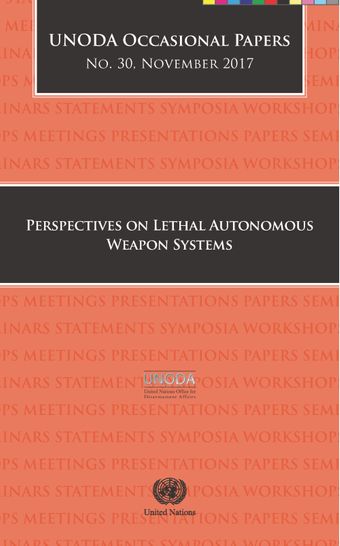
UNODA Occasional Papers No. 30, November 2017
Perspectives on Lethal Autonomous Weapon Systems
Jan 2018
Book
This publication considers lethal autonomous weapon systems approaching the issue from five different perspectives. It has been published ahead of the first meeting of the Group of Governmental Experts of the High Contracting Parties to the Convention on Certain Conventional Weapons mandated to examine issues related to emerging technologies in the area of lethal autonomous weapon systems in the context of the objectives and purposes of the Co Read More

UNODA Occasional Papers No.29: Bringing Democracy to Disarmament - A Historical Perspective on the Special Sessions of the General Assembly Devoted to Disarmament, October 2016
Nov 2016
Book
The United Nations Office for Disarmament Affairs (UNODA) Occasional Papers is a series of ad hoc publications presenting in edited form papers or statements made at meetings symposiums seminars workshops or lectures that deal with topical issues in the field of arms limitation disarmament and international security. They are intended primarily for those concerned with these matters in Government civil society and in the academic comm Read More

UNODA Occasional Papers No.28: Rethinking General and Complete Disarmament in the Twenty-First Century, October 2016
Oct 2016
Book
The United Nations Office for Disarmament Affairs (UNODA) Occasional Papers is a series of ad hoc publications presenting in edited form papers or statements made at meetings symposiums seminars workshops or lectures that deal with topical issues in the field of arms limitation disarmament and international security. They are intended primarily for those concerned with these matters in Government civil society and in the academic comm Read More
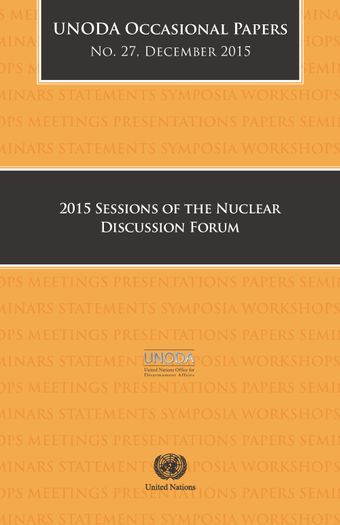
UNODA Occasional Papers No. 27: Sessions of the Nuclear Discussion Forum, December 2015
Jun 2016
Book
The United Nations Office for Disarmament Affairs (UNODA) Occasional Papers is a series of ad hoc publications presenting in edited form papers or statements made at meetings symposiums seminars workshops or lectures that deal with topical issues in the field of arms limitation disarmament and international security. They are intended primarily for those concerned with these matters in Government civil society and in the academic comm Read More

UNODA Occasional Papers No.26: The New Zealand Lectures on Disarmament by High Representative Angela Kane, June 2014
Jul 2014
Book
The United Nations Office for Disarmament Affairs (UNODA) Occasional Papers is a series of ad hoc publications presenting in edited form papers or statements made at meetings symposiums seminars workshops or lectures that deal with topical issues in the field of arms limitation disarmament and international security. They are intended primarily for those concerned with these matters in Government civil society and in the academic comm Read More
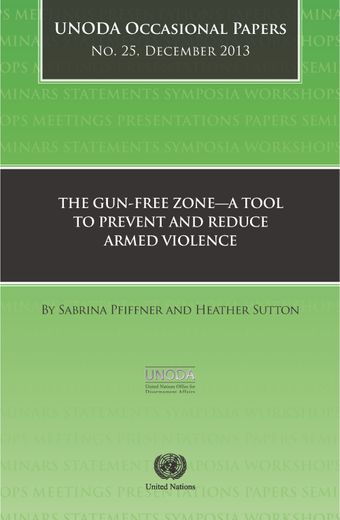
UNODA Occasional Papers No.25: The Gun-Free Zone - A Tool to Prevent and Reduce Armed Violence, December 2013
Jun 2014
Book
UNODA Occasional Papers is a series of ad hoc publications that deal with topical issues in the field of arms limitation disarmament and international security and are intended primarily for those concerned with these matters in Government civil society and in the academic community. This paper brings together existing information and experiences from practitioners and policy makers and analyzes the impact of Gun-Free Zones (GFZs) in order to determin Read More

UNODA Occasional Papers No. 24: Contrasting Perspectives on Tactical Nuclear Weapons in Europe
Understanding the Current Debates
Dec 2013
Book
This series of ad hoc publications deals with topical issues in the field of arms limitation disarmament and international security and are intended primarily for those concerned with these matters in Government civil society and in the academic community. This issue focuses on tactical nuclear weapon (TNW) reduction both in the US and Europe. Despite the many debates little has been done in recent years to reduce or eliminate the forward-deployed Read More
No more items...
